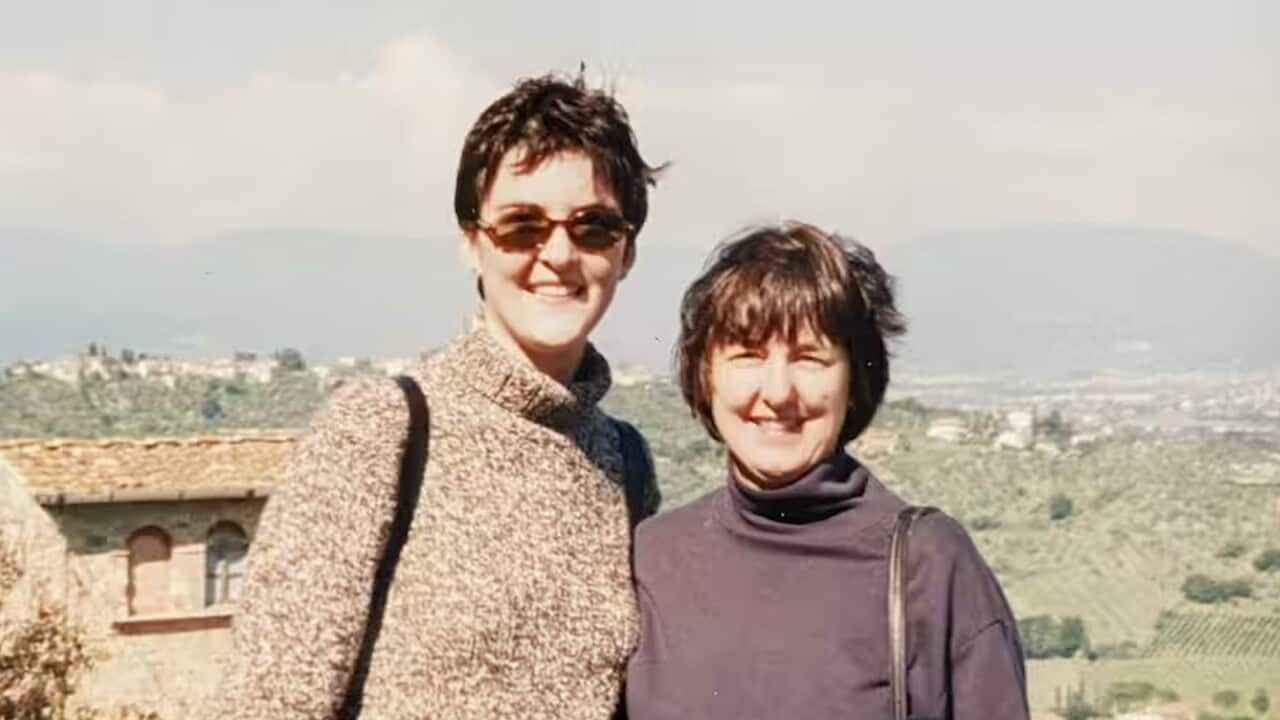What drives us to leave a legacy and what happens when we inherit a legacy we don't want? Watch Insight episode Leaving a legacy on
Stream free On Demand

Leaving A Legacy
episode • Insight • Current Affairs • 52m
episode • Insight • Current Affairs • 52m
Legacies are often amazing things passed on to help others. But mine is one nobody would want.
As the older sibling to a person with an , I inherited a legacy of life-long care.
It's a legacy that robbed me of a normal life.
And if I'd known how overwhelming and exhausting it would be, I can’t honestly say I would’ve chosen to be here.
The 'third parent'
Caring for my little sister has been my role for 55 years.
My childhood was a blur, with most of it spent in survival mode.
There were no support agencies to help my parents, so it fell on me to be the 'third parent'.

Sim (far right) says her childhood was challenging due to her sister (second from left), having a disability and her parents receiving little support. Source: Supplied
I couldn't have normal conversations with the kids at school, and I could never plan my future like them.
We never had a typical sister relationship. She was violent, with explosions of frustration and anger, so I was mostly scared of her.
But then I’d be fiercely protective of her when the bullies and their parents abused us in the street or at school. It bonded us in a way.
My child’s brain believed we were broken, which was why everyone picked on us. But I had to protect her, because she didn’t understand that.
My child’s brain believed we were broken, which was why everyone picked on us.
When I was around 10, she started crying when the bullies came for us, so I hugged her. For the first time, she hugged me back.
Looking back, I think that was the moment I knew what love between us looked like.
'They couldn't let her go'
As soon as I turned 18, I moved out of home. I went miles away to escape the caring role.
My mother was furious, but my father was very supportive.
In hindsight, it didn’t feel like an escape. It was a 25-year holiday away from the legacy.
I still had to go back and help out when it was too much for my parents, but I relished having some distance away from the day-to-day challenges.
For years, I tried to convince my parents to place my sister in professional care.
I wanted us to support her through the change while we were all still with her, because if one of us died, it would be too painful for her to go into care while grieving.
Instead, their expectation was that I would be there.
And they loved her so much, they couldn’t let her go.
As my parents aged, the caring role crept back into my life.
But now I wasn't just looking after my sister, I was also looking after them.
And then bang! The legacy has arrived in full.

Sim says people see her as "the self-sacrificing sibling", which makes her feel invisible. Source: Supplied
All I wanted to do was grieve the loss of my parents.
An identity I didn't choose
Now that I’m the full-time guardian of my sister, that’s all people see of me.
I’m an appendage to her life, because people want to see the self-sacrificing sibling, the care-giving sibling.
But none of that describes the reality of what this legacy entails.
My life is just a mass of decision-making, seven days a week.
It’s constant interactions with government agencies, support services, medical specialists and therapists.
It’s using my days off work to attend appointments and meetings. And each interaction or decision is an emotional whirlwind.
Caring for my sister is a draining, full-time job that has also affected my personal relationships.
My romantic relationships weren't able to weather the stresses and commitment that looking after my sister required.
And I don’t have any time or energy to maintain close friendships.
I feel overwhelmed and lonely.
This isn’t a legacy anyone would want.
I see other siblings with similar legacies who are sad, alone and desperately trying to understand and escape their fate.
They struggle to have the hard conversations with their parents, but these talks are important. I honestly believe if my parents had placed my sister into care earlier on, then all of us could have had different lives.
My parents deserved a retirement together without that pressure of care.
I deserved to plan and live my own life, and importantly, my sister deserved the right to develop her own abilities, no matter how small.
A lonely future
Today, my sister is cared for by amazing workers, so that part of the legacy has been wonderful.
But for me, my future seems to get heavier and lonelier as I age.
I can’t walk away from my responsibility; that would be too unkind a thing to do.
Even though I’m alone, I don't want her to feel alone.
I’m all my sister has. There has to be someone who loves her, someone who isn’t paid to be there.
I don't know what it is to be a sister, only what it is to be a carer.
But maybe that's what being a sister means for me.
* Full name withheld.
And for more stories head to , hosted by Kumi Taguchi. From sex and relationships to health, wealth, and grief Insightful offers deeper dives into the lives and first-person stories of former guests from the acclaimed TV show, Insight.
READ MORE

Insightful













